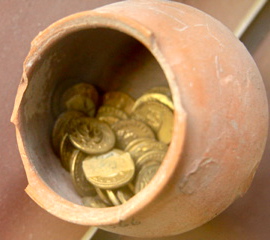Today we celebrate the gift of the Eucharist, the Body and Blood of Our Lord. We partake of him every time we received Holy Communion, and in the Eucharist Our Lord sacramentally remains with us always for our consolation and adoration.
In today’s First Reading Moses reminds the people of Israel, just before their entry after forty years into the Promised Land, that the Lord fed them in their need, just as he feeds us through the Eucharist. The manna that the Lord sent to the Israelites during their wandering in the desert is a foreshadowing of the Eucharist. Manna was unknown to the ancestors of the Israelites in today’s First Reading. The Eucharist is a food unheard of in human history before the coming of Christ and nothing will ever match it, because it is God himself. In Chapter 6 of John’s Gospel Our Lord’s Gospel describes the bread that he will give as something even greater than the manna the Israelites received in the desert, because manna did not give them eternal life as the Eucharist does. Despite Israel’s infidelity and mistrust the Lord fed them something they’d never seen before. When the first flakes of manna appeared, they had to ask what they were. If manna caused confusion in the desert we can only imagine how mind-blowing it was to Our Lord’s listeners when he taught them that he himself was food sent from Heaven, food they’d have to eat to live forever.
In today’s Second Reading Paul reminds us that Holy Communion enables us to participate in Our Lord’s sacrifice of his Body and Blood and in so doing draws us into communion with God and with each other. In ancient religions sacrifices were made and then partaken of to express a communion with the deity to which the sacrifice was being made. In Christian worship God sacrifices himself to achieve communion, and we participate in that sacrifice in order to participate in that communion. Our Lord reconciled us with the Father through the sacrifice of his Body and Blood, and taught us to eat and drink that Body and Blood in order to have communion with him. Breaking bread with someone is a gesture of peace and fraternity. Our Lord let himself be that Bread, let himself be broken so that we could restore communion not only with the Father, but with each other. In every celebration of the Eucharist that bread is broken again for us. Throughout the world, wherever it is celebrated, believers are spiritually one body because through partaking of the Body of Christ in the Eucharist they become united with God and with each other.
In today’s Gospel Our Lord teaches us that he is true food and true drink that nourish us so much that those who partake of him will live forever. The manna mentioned in today’s First Reading was something the people of Israel had never seen before. Moses explained that its purpose was not only to feed man, but to show him that man must rely on the word of God in order to live. Our Lord is the Word of God, and without him there is no life. He is not only truly the Word of God that is necessary for eternal life; he is the bread of life too. Attempts have been made to interpret Our Lord’s words today metaphorically, but he is very clear: “my flesh is true food, and my blood is true drink.” This is the Scriptural basis, among other passages, for our belief that the Eucharist is the Body and Blood of Christ. Through eating his flesh and drinking his blood we remain in communion with Christ and, through him, we remain in communion with the Father. Through eating his flesh and drinking his blood we not only remain on good terms with the Lord; we receive ongoing spiritual nourishment that will one day lead us to eternal life, if we remain in Christ. Christ taught this before he ever raised bread and said, “this is my body”: it required faith in Christ to accept this teaching, and it does even today. It was only at the Last Supper that his disciples really understood that bread and wine would become Christ’s Body and Blood. That Last Supper became the first of many celebrations of the Eucharist, including the one we celebrate today, but they are all thanks to Our Lord and his sacrifice, making himself true food and drink for us.
In today’s Gospel we were taught that the Lord wants to remain with us. Do we want to remain with him? How do we show that desire to remain with him? Reception of the Eucharist is a start, but Eucharistic adoration is the best way to go the distance. We all do a little Eucharistic adoration in the silent moments after receiving Holy Communion (I hope; if not, start there), but do we spend any more time with Our Lord than that? Do we ever come visit him for no other reason than spending some quality time with him? The blessing of having the Eucharist is that Our Lord is sacramentally present; the Eucharist reminds us physically and gives us a place to go and be with him sacramentally, whether we’re participating in Mass or not. If there is an adoration chapel near you, or times of adoration scheduled at your parish, pay Our Lord a visit. You’ll be amazed at how much silent adoration of Our Lord will help your spiritual life.
Readings: Deuteronomy 8:2–3, 14b–16a; Psalm 147:12–15, 19–20; 1 Corinthians 10:16–17; John 6:51–58. See also Solemnity of Corpus Christi, Cycle C and Solemnity of Corpus Christi.





